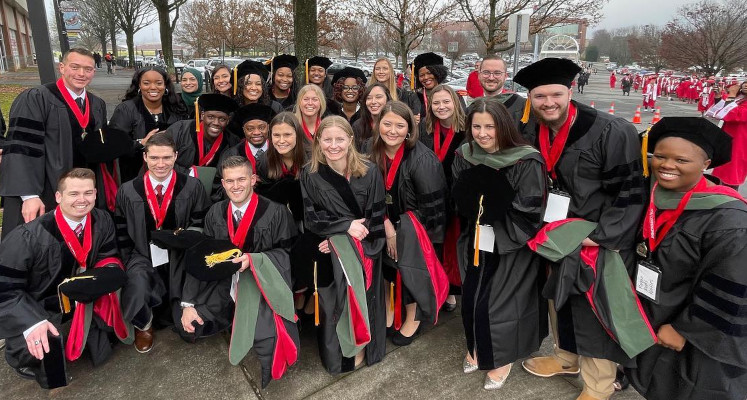Program History
The Physical Therapy program at Winston-Salem State University was established in 1993 as a Bachelors of Physical Therapy degree granting program by Dr. Eddie Harden, JD, PT, the founder and inaugural chair of the Department. The faculty of the Department of Physical Therapy is proud to continue Dr. Harden's legacy and vision. Since that time, the program has continued to fulfill its mission to increase the numbers of minority physical therapists in the state and the nation. The Bachelors program transitioned to a Master’s degree program in 1999 after obtaining approval from the North Carolina Board of Governors. The first Master’s degree students entered the program in May 2000 and became one of only six accredited post-baccalaureate physical therapy education programs in the country based on a campus of a Historically Black College or University (HBCU) and the only one in North Carolina. In April, 2010, the North Carolina Board of Governors approved the transition of the Master’s degree program to the Doctor of Physical Therapy program, thereby establishing the first doctoral degree at Winston-Salem State University. The program previous had the distinction of being the first graduate degree program on campus. The program remains fully accredited by the Commission on Accreditation in Physical Therapy Education.
About the WSSU Department of Physical Therapy
Housed within the F.L. Atkins Building in the School of Health Sciences (SOHS), the Department of Physical Therapy consists of highly qualified full-time faculty and staff members, several specialized associated/adjunct faculty members, a full-time laboratory coordinator, and approximately 80 graduate students. Departmental state-of-the-art facilities are highlighted by approximately 8,700 sq. ft. of dedicated classroom, office and laboratory space and a 2,000 sq. ft. Human Performance and Biodynamics Laboratory in collaboration with Wake Forest University (WFU) Department of Orthopaedic Surgery. This laboratory contains a full complement of motion analysis, EMG, force platforms, pressure mapping, neuromuscular and postural assessment equipment along with virtual reality rehabilitation technology. The program also has access to space at the Walkertown Community Care Center which is the largest and most comprehensive free clinic in North Carolina. The program has access throughout the week to patient care rooms, a diagnostic clinical laboratory, imaging equipment, and a full range of practicing professionals (physicians, nurses, social workers, pharmacists, medical translators, etc) who provide volunteer service for over 17,000 uninsured individuals whose income is 200% below the federally defined poverty level. Opportunities to volunteer in the community are consistently offered, such as helping to provide services with the MSFit and REACHE programs, and performing free fall risk screenings at various healthcare events throughout the region. The new SOHS Clinical Simulation Laboratory, located in the New Science Building, offers students in the program an opportunity to access a 3,000 sq. ft. "virtual hospital" setting, with adult, pediatric and infant human patient simulators. The equipment in this simulation lab will allow students to practice acute care skills and competencies in a realistic setting. Also, the newly constructed Intergenerational Center (a collaborative effort between local Universities and healthcare institutions) a clinical space dedicated to the PT Department, to provide health and preventive care services and programming for the underserved population of the surrounding areas. Here, students and faculty will have access to innovative equipment and materials used in contemporary physical therapy practice.
The rigorous 3-year Doctor of Physical Therapy program challenges and develops students year-round. A new class of DPT students are admitted each January, with completion of program requirements occurring in the Fall semester of the third year. In addition to classroom and lab based studies, DPT students will participate in Clinical Education experiences, consisting of a total of 36 weeks of rotations at four different clinical sites under the direct supervision of highly experienced and dynamic clinical instructors.
Additionally, the WSSU Department of Physical Therapy offers a transitional-DPT program that is designed for professionals who have graduated with a Bachelor’s or a Master’s degree in physical therapy and are practicing in the field. The t-DPT program at WSSU prepares professionals to succeed as autonomous practitioners in an evolving global health care environment.
The WSSU Department of Physical Therapy also offers a fully-accredited Neurologic Clinical Residency Program, in partnership with Novant Health, allowing licensed physical therapists to elevate their neurologic clinical practice, advance their careers, and become leaders in the physical therapy profession. Throughout the 12-month program, residents work in neurological care alongside mentors at Novant Health facilities across the region. Residents also take courses and provide guest lectures to students enrolled in the Doctor of Physical Therapy program.

